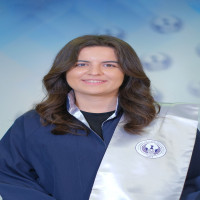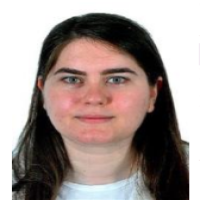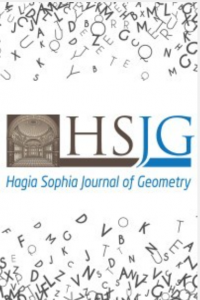Research Article
Aim & Scope
Hagia Sophia Journal of Geometry (HSJG) is established to ensure the advancement of mathematics. Editors and referees examine the submitted papers on the basis of scientific merit regardless of authors' nationality and gender, country of residence, institutional affiliation and political views.
Hagia Sophia Journal of Geometry (HSJG) accepts original research papers in all areas of Geometry. HSJG covers the following main areas: differential geometry, manifolds, Lie groups, geometric algebra, finite geometries, combinatorial geometry, kinematic geometry, Euclidean geometry, non-Euclidean geometries, matrix theory, quantum groups, Hopf algebra and and Clifford algebra.
Research in these subjects has been very lively recently, and the interplay between individual areas has enriched them all. The journal seeks high-quality original papers of both research and expository nature.
Author Guidelines
Manuscript Submission
Submission of a manuscript implies: that the work described has not been published before; that it is not under consideration for publication anywhere else; that its publication has been approved by all co-authors, if any, as well as by the responsible authorities – tacitly or explicitly – at the institute where the work has been carried out. The publisher will not be held legally responsible should there be any claims for compensation.
Copyright Form
The corresponding author should sign copyright form and upload as a pdf file to evaluation system.
Permissions
Authors wishing to include figures, tables, or text passages that have already been published elsewhere are required to obtain permission from the copyright owner(s) for both the print and online format and to include evidence that such permission has been granted when submitting their papers. Any material received without such evidence will be assumed to originate from the authors.
Online Submission
Please follow the hyperlink “Submit a Manuscript” on the right and upload all of your manuscript files following the instructions given on the screen.
Title Page
The title page must include:
· The name(s) of the author(s)
· A concise and informative title
· The affiliation(s) and address(es) of the author(s)
· The e-mail address of the corresponding author
· The 16-digit ORCID of the author(s)
Abstract
Please provide an abstract of maximum 350 words. The abstract should not contain any undefined abbreviations or unspecified references.
Keywords
Please provide at least 3 keywords which can be used for indexing purposes.
Text Formatting
Manuscripts should be submitted in PDF. After acceptance, Please use HSJG template.tex. The template file will be sent to authors after acceptance decision.
Word files or other formats are not accepted.
Headings
Please use the decimal system of headings with no more than three levels.
Abbreviations
Abbreviations should be defined at first mention and used consistently thereafter.
Conclusion
Section of "Conclusion" is mandatory which includes a summary of your paper and future works.
Acknowledgments
Acknowledgments of people, grants, funds, etc. should be placed in a separate section on the title page. The names of funding organizations should be written in full.
Reference list
The list of references should only include works that are cited in the text and that have been published or accepted for publication. Personal communications and unpublished works should only be mentioned in the text. Do not use footnotes or endnotes as a substitute for a reference list.
No Charge
There is no publication fee and no charge for submitting or processing a manuscript to HSJG.
HSJG Style Package
Please make sure the following files are in the same folder:
1) HSJG Template-Latex
2) HSJG Template-Logo
3) HSJG Template-cls
Ethical Principles and Publication Policy
Ethical Principles and Publication Policy
This guide was prepared by the Hagia sophia Journal of Geometry (HSJG) to draw attention to the compliance of publishers, editör-in-chief, editors, reviewers, and authors with ethical principles and scientific data. The editorial board follows the guidelines of the Journal Editors Practice Guide published by the International Ethical Principles and Publication Policy Publication Ethics Committee (Committee on Publication Ethics, 2011).
Editor-in-Chief and Editors
Editor-in-chief and editors do not share information about the article with anyone except the author/authors, language, spelling, layout and other publication editors. Editors evaluate articles regardless of the author's/authors' ethnic origin, gender, nationality and religious beliefs.
Editor in chief and editors evaluate the article by paying attention to scientific and ethical values and make a final decision. It is the responsibility of the editor-in-chief and editors to take the necessary measures in order to select the reviewers suitable for the study, to have no interest relationship between the authors and the reviewers, and to evaluate the work by the reviewers in an impartial and scientific manner.
Editor-in-Chief and editors examine the publication according to the relevant rules with and make a decision if any situation contrary to publication ethics is detected or any situation is reported. If a contradiction is detected, it publishes a statement regarding this publication.
Reviewers
The reviewers evaluate the articles by paying attention to rules such as confidentiality, impartiality, conflict of interest, and ethical principles, without allowing the author' /authors' gender, religion, nationality to influence the assessment.
If the article reviewed article is similar to a previously published study,, the relevant evidence should be reported by the reviewer and the situation should be reported to the editors.
If the reviewers notice quotations or methods used in the study without reference, they should inform the author.
Authors
Plagiarism, concealment of conflict of interest, plagiarism, forgery, distortion, duplication, slicing, unfair authorship, virtual or shadow authorship, gift authorship, honorary authorship are considered ethical issues.
Compliance of the articles with ethical rules is under the responsibility of the author / authors.
If dangerous substances or substances, unusual materials or procedures were used during the preparation of the scientific study sent to the journal, these issues should be explained in detail in the study.
If the subject, guinea pig, healthy or sick individual has been used in the scientific research, the reasons for use should be clearly stated.
It should also be ensured that all necessary permits have been obtained and that volunteerism is essential.
While conducting scientific research, sufficient and relevant resources should be given about the study.
The article sent to the journal must be original, it must not be published elsewhere before, and must not be evaluated elsewhere and in another language.
Each of the article authors must contribute significantly to the article, and the person or persons who do not contribute to the article should not be added to the article as an author.
No author additions or deletions are made while the article is being evaluated or after the article has been accepted.
Archiving
Hagia Sophia Journal of Geometry (HSJG) offers all the articles it has published in full text to all users through the Dergipark system.
Copyright
Hagia Sophia Journal of Geometry (HSJG) is a free open access journal licensed under Creative Commons Attribution-NonCommercial- NoDerivatives 4.0 International (CC BY-NC-ND 4.0).
The authors retain their copyright and retain the original right to publish as the work is simultaneously licensed under Creative Commons Attribution-NonCommercial-NoDerivatives 4.0 International (CC BY-NC-ND 4.0), which allows others to share the work with the authors' approval.
Indexes
Other Indexes
Journal Boards
Editor in Chief

Managing Editors

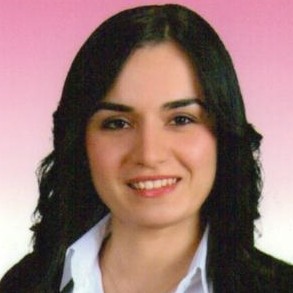
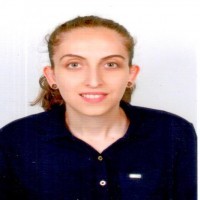
Editorial Board

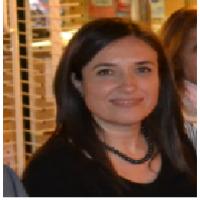










 Web
Web

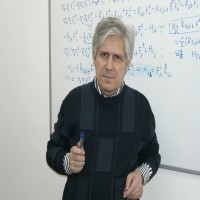


Editorial Board (Continue)
Prof.Dr.Rüstem KAYA
Türkiye
rkaya@ogu.edu.tr
Konular: Matematik
Prof. Dr. Osmar ALESSİO
Brezilya
osmar.alessio@uftm.edu.br
Konular: Diferansiyel Geometri, Türevleme, Yazılım Mühendisliği, Uygulamalı Matematik
Kurum: Universidade Federal do Triangulo Mineiro (UFTM)
Prof.Dr.Mustafa ÇALIŞKAN
Türkiye
Konular: Matematik
Sayed Abdel-Naeim Badr
Mısır
sayed_badr@ymail.com
Konular: Matematik
Kurum: Assiut Üniversitesi
Prof. Dr. Praveen Singh BISHT
Hindistan
rkaya@ogu.edu.tr
Kurum: Kumaun Üniversitesi
Dr. Ahmed T Ali
ABD
aahmed@uta.edu
Konular: Matematik
Kurum: Arlington'daki Teksas Üniversitesi
Prof Dr. Hasan Hilmi Hacısalihoğlu
Prof. Dr. Sadık Keleş
sadik.keles@inonu.edu.tr
İnönü Üniversitesi
Prof.Dr.Mahmut Ergüt
mergut@nku.edu.tr
Tekirdağ Namık Kemal Üniversitesi
Prof.Dr.Osman GÜRSOY
osmang@maltepe.edu.tr
Prof.Dr.Süha YILMAZ
suha.yilmaz@deu.edu.tr
Dokuz Eylül Üniversitesi
Student Editorial Board


Linguistic Consultant

Proofreading



Desing
Secretary List
